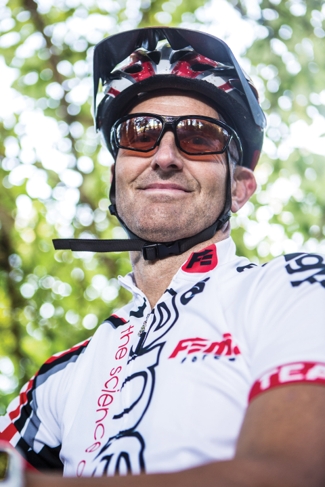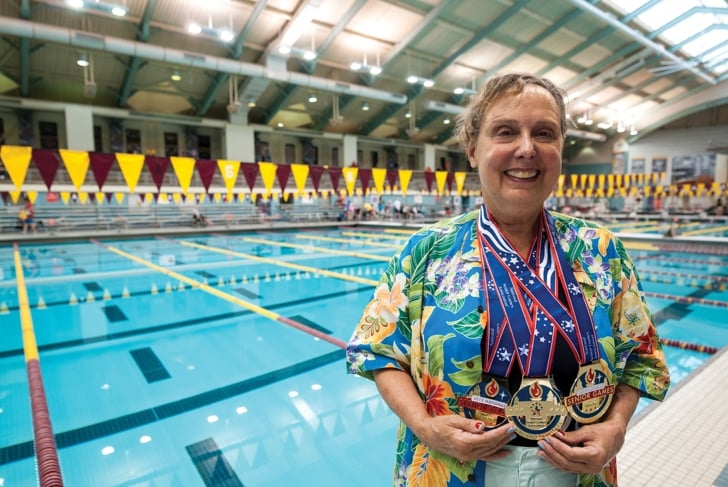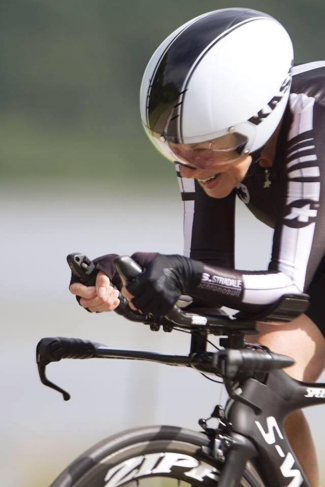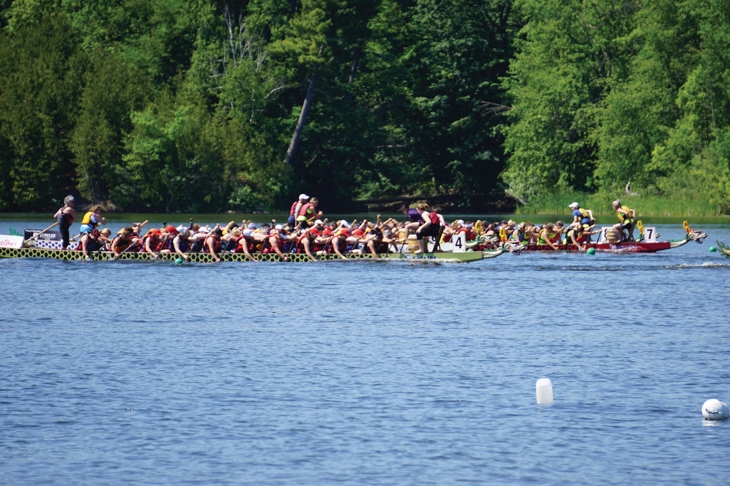
These fitness enthusiasts in their 40s to 70s show that age isn’t just a number—it’s also an asset. They’re motivated like never before to stay at the top of their exercise game. Here’s how they do it.
“Over the hill.” It’s a term we use once we hit age 40. Our athletic pursuits often wind down when we hit this milestone, but these age-defying athletes aren’t slowing their pace. If anything, they’re sprinting for the next hill.
Swim, bike, run, repeat

Triathlete Dave Chamberlain in Maple Ridge, BC, started regularly doing triathlons in his mid-30s. Now in his mid-40s, he does multiple events a year. In a recent Half Ironman, he finished near the top of his age group and in the top 200s out of all competitors.
“I want to set a life example for my daughter and show her [the] many positives from leading a healthy, active lifestyle,” says Chamberlain. “[It makes me] a better father, husband, and person.”
For him, age is an asset. “The science of training has changed so much and continues to evolve,” he says. “I wish I knew half of what I know now back in my 20s. I think a key element to keeping me strong and able to continue to compete in triathlons is strength training.”
Protein pumps
Aging bodies need more post-exercise rest and nutrients. “With all the training hours … the right balance of nutrients is key,” says Chamberlain. Protein shakes can offer a good source of post-exercise nutrition.
Swimming at 70

Dr. Jane Katz swam at the 1964 Olympics. Now in her 70s, she’s still swimming laps around her competition. She’ll be inducted into the International Swimming Hall of Fame this fall.
“The endorphins released while swimming keep me going back to the pool,” says Katz. One of her proudest moments is competing in the National Senior Games—think the Olympics for the 50-plus crowd. “It is a thrill to do well and witness the camaraderie of the competition,” says Katz. This year, Quebec hosts the Games.
Katz attributes some of her success to proper stretching and pairing up with an exercise partner. “Find a buddy that motivates you,” suggests Katz. “A buddy is as much spiritual as it is physical … they can push you to stay active.”
Hydration helps
Our bodies don’t signal thirst as quickly once we hit age 40, leaving us more prone to dehydration. “Hydrating is necessary, especially in the water,” warns Katz. “You don’t realize how much you’re perspiring.”
Exercise after 40
Only 18 percent of Canadians ages 40 to 59 meet exercise recommendations of 150 minutes of moderate to vigorous intensity aerobic physical activity each week. This drops to 12 percent for those over 60.
Cycling sexagenarian

Breast cancer survivor Cheryl Cherry began cycling in her early 60s and entered her first competition seven months later. She’s competed every year since and won a gold medal at last year’s National Senior Games.
“Each day I wake up and say, ‘It’s time to step out of my comfort zone!’” says Cherry. “Age is just a number. I am in the best physical shape of my life!”
With her new exercise came a new vegan diet. “My health, competitive performance, and energy levels have improved immensely,” Cherry says.
“Take the initiative at a young age to take care of your body,” advises Cherry. “It will become a habit that will keep you happier, stronger, and healthier as you head into each new decade.”
Head over heels
Approximately 20 to 30 percent of Canadian seniors fall annually, making it the top cause of injury-related hospitalization. Balance-improving exercises such as cycling may minimize our risk of falls.
What happens when we age?
- Our lungs reach peak performance in our early 20s, and then our aerobic capacity drops by up to 15 percent every decade. Exercise can make our lungs perform as if they’re years younger.
- We lose about 1/4 lb (125 g) of muscle mass every year after age 50. This lowers our metabolism so we’re more likely to gain weight. Additionally, muscle strength and endurance drops by 10 to 15 percent a decade starting in our 40s, rising to 25 to 40 percent after our 70s. Resistance training can slow or stop this.
Cancer-conquering dragons

Gwen Vernon got her breast cancer diagnosis in her late 40s. The Hamilton, Ontario, athlete took up paddling with a friend she made during her treatment. The women joined Knot A Breast, a dragon boat organization that raises awareness about quality of life after breast cancer treatment.
“I was amazed at the strength of these women and the power of their individual stories,” says Vernon. During their training, her friend’s cancer came back. “She was never well enough to put a paddle in the water, and I committed to paddling for both of us.” Two years after her diagnosis, Vernon—alongside her Knot A Breast colleagues—won her first international dragon boat championship.
Through her cancer and dragon boat journey, Vernon discovered how our toughest hurdles are often the mental ones. “Each time I reach a goal, new opportunities and challenges present themselves,” she says. “I’ve learned with dedication, preparation, and hard work, nothing is impossible!”
For other older athletes who want to excel, she suggests starting in the kitchen. “My performance … is directly dependent on a combination of healthy diet, adequate rest, [and] cardio and weight training,” she says. “Like a high-performance sports car, the fuel you choose impacts your ability to succeed.”
Vernon won’t let anything stop her. Not cancer. Not even age. “I paddle with people well into their 70s,” she says. “We love … racing against teams less than half our age. We may not always win, but we definitely make it exciting!”
Sugar and cancer
Researchers are studying the relationship between sugar and cancer. “I eat as clean as possible,” says Vernon. “During my treatment, I [researched] the effects of refined sugars as triggers for cancer.”
Exercise tips for our 40s and beyond
Exercise can help prevent age-related diseases, extend life expectancy, and boost quality of life. As our athletes revealed, it’s never too late to start.
- Aim for 150 minutes of weekly aerobics, regardless of age. Talk to your health care practitioner about medical conditions, or if you aren’t sure how much or what type of exercise is best.
- Lift weights twice a week to minimize bone loss as we age.
- Hop in a pool. Aquatic exercise eases the joint pain that often comes with aging.
- Recovery is critical. Don’t push yourself the way you did when you were younger. Take a break if you feel aches and pains.





